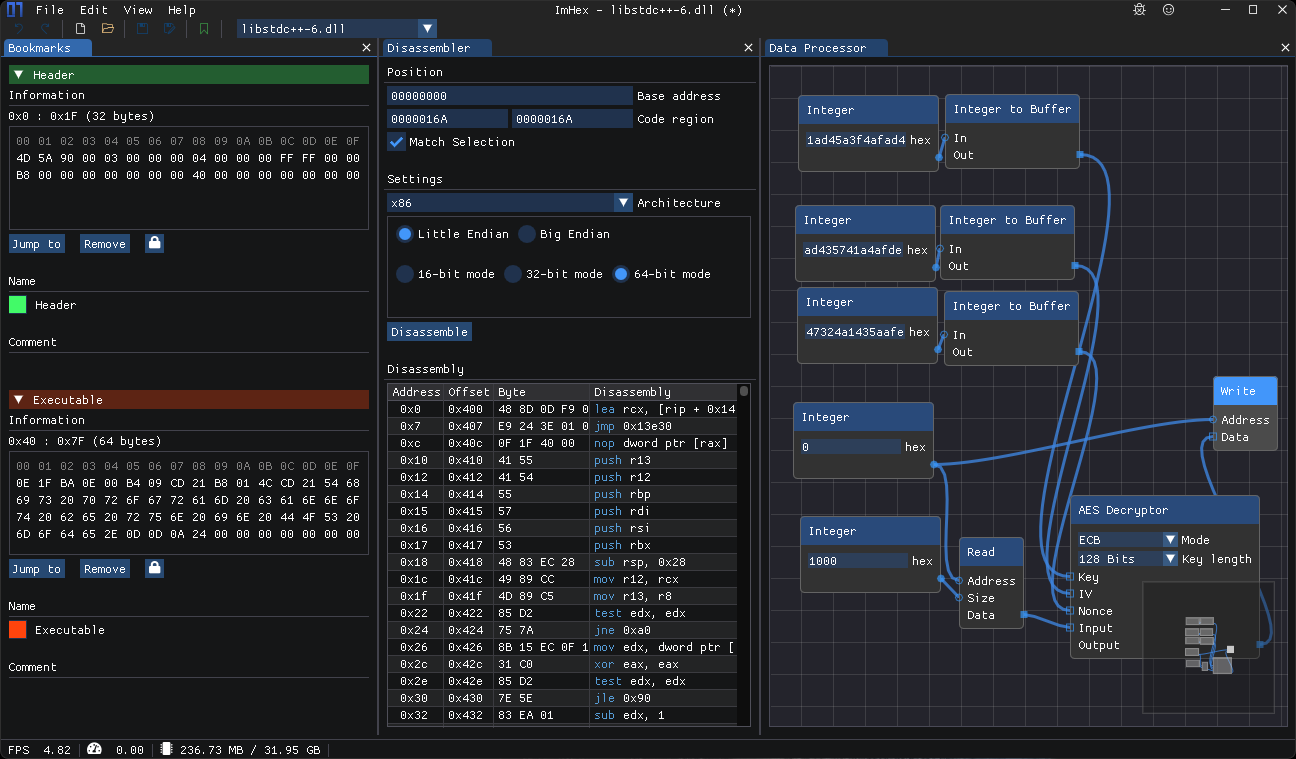ImHex - A Free Feature-rich Hex Editor for Reverse Engineers, and Pro Programmers
Table of Content
Hex editors are primarily used by programmers and developers who work with hexadecimal data, such as computer networks, embedded systems, and digital hardware.
They are particularly useful for tasks such as data manipulation, string manipulation, and debugging.
ImHex is a feature rich open-source Hex editor app built for reverse engineering.
Features
Featureful hex view
- Byte patching
- Patch management
- Infinite Undo/Redo
- "Copy bytes as..."
- Bytes
- Hex string
- C, C++, C#, Rust, Python, Java & JavaScript array
- ASCII-Art hex view
- HTML self-contained div
- Simple string and hex search
- Goto from start, end and current cursor position
- Colorful highlighting
- Configurable foreground highlighting rules
- Background highlighting using patterns, find results and bookmarks
- Displaying data as a list of many different types
- Hexadecimal integers (8, 16, 32, 64 bit)
- Signed and unsigned decimal integers (8, 16, 32, 64 bit)
- Floats (16, 32, 64 bit)
- RGBA8 Colors
- HexII
- Binary
- Decoding data as ASCII and custom encodings
- Built-in support for UTF-8, UTF-16, ShiftJIS, most Windows encodings and many more
- Paged data view
Custom C++-like pattern language for parsing highlighting a file's content
- Automatic loading based on MIME types and magic values
- Arrays, pointers, structs, unions, enums, bitfields, namespaces, little and big endian support, conditionals and much more!
- Useful error messages, syntax highlighting and error marking
- Support for visualizing many different types of data
- Images
- Audio
- 3D Models
- Coordinates
- Time stamps
Theming support
- Doesn't burn out your retinas when used in late-night sessions
- Dark mode by default, but a light mode is available as well
- Customizable colors and styles for all UI elements through shareable theme files
- Support for custom fonts
Importing and Exporting data
- Base64 files
- IPS and IPS32 patches
- Markdown reports
Data Inspector
- Interpreting data as many different types with endianness, decimal, hexadecimal and octal support and bit inversion
- Unsigned and signed integers (8, 16, 24, 32, 48, 64 bit)
- Floats (16, 32, 64 bit)
- Signed and Unsigned LEB128
- ASCII, Wide and UTF-8 characters and strings
- time32_t, time64_t, DOS date and time
- GUIDs
- RGBA8 and RGB65 Colors
- Copying and modifying bytes through the inspector
- Adding new data types through the pattern language
- Support for hiding rows that aren't used
Node-based data pre-processor
- Modify, decrypt and decode data before it's being displayed in the hex editor
- Modify data without touching the underlying source
- Support for adding custom nodes
Loading data from many different data sources
- Local Files
- Support for huge files with fast and efficient loading
- Raw Disks
- Loading data from raw disks and partitions
- GDB Server
- Access the RAM of a running process or embedded devices through GDB
- Intel Hex and Motorola SREC data
- Process Memory
- Inspect the entire address space of a running process
Data searching
- Support for searching the entire file or only a selection
- String extraction
- Option to specify minimum length and character set (lower case, upper case, digits, symbols)
- Option to specify encoding (ASCII, UTF-8, UTF-16 big and little endian)
- Sequence search
- Search for a sequence of bytes or characters
- Option to ignore character case
- Regex search
- Search for strings using regular expressions
- Binary Pattern
- Search for sequences of bytes with optional wildcards
- Numeric Value search
- Search for signed/unsigned integers and floats
- Search for ranges of values
- Option to specify size and endianness
- Option to ignore unaligned values
Data hashing support
- Many different algorithms available
- CRC8, CRC16 and CRC32 with custom initial values and polynomials
- Many default polynomials available
- MD5
- SHA-1, SHA-224, SHA-256, SHA-384, SHA-512
- Adler32
- AP
- BKDR
- Bernstein, Bernstein1
- DEK, DJB, ELF, FNV1, FNV1a, JS, PJW, RS, SDBM
- OneAtTime, Rotating, ShiftAndXor, SuperFast
- Murmur2_32, MurmurHash3_x86_32, MurmurHash3_x86_128, MurmurHash3_x64_128
- SipHash64, SipHash128
- XXHash32, XXHash64
- Tiger, Tiger2
- Blake2B, Blake2S
- CRC8, CRC16 and CRC32 with custom initial values and polynomials
- Hashing of specific regions of the loaded data
- Hashing of arbitrary strings
Diffing support
- Compare data of different data sources
- Difference highlighting
- Table view of differences
Integrated disassembler
- Support for all architectures supported by Capstone
- ARM32 (ARM, Thumb, Cortex-M, AArch32)
- ARM64
- MIPS (MIPS32, MIPS64, MIPS32R6, Micro)
- x86 (16-bit, 32-bit, 64-bit)
- PowerPC (32-bit, 64-bit)
- SPARC
- IBM SystemZ
- xCORE
- M68K
- TMS320C64X
- M680X
- Ethereum
- RISC-V
- WebAssembly
- MOS65XX
- Berkeley Packet Filter
Bookmarks
- Support for bookmarks with custom names and colors
- Highlighting of bookmarked region in the hex editor
- Jump to bookmarks
- Open content of bookmark in a new tab
- Add comments to bookmarks
Featureful data analyzer and visualizer
- File magic-based file parser and MIME type database
- Byte type distribution graph
- Entropy graph
- Highest and average entropy
- Encrypted / Compressed file detection
- Digram and Layered distribution graphs
YARA Rule support
- Scan a file for vulnerabilities with official yara rules
- Highlight matches in the hex editor
- Jump to matches
- Apply multiple rules at once
Helpful tools
- Itanium, MSVC, Rust and D-Lang demangler based on LLVM
- ASCII table
- Regex replacer
- Mathematical expression evaluator (Calculator)
- Graphing calculator
- Hexadecimal Color picker with support for many different formats
- Base converter
- Byte swapper
- UNIX Permissions calculator
- Wikipedia term definition finder
- File utilities
- File splitter
- File combiner
- File shredder
- IEEE754 Float visualizer
- Division by invariant multiplication calculator
- TCP Client/Server
- Euclidean algorithm calculator
Built-in Content updater
- Download all files found in the database directly from within ImHex
- Pattern files for decoding various file formats
- Libraries for the pattern language
- Magic files for file type detection
- Custom data processor nodes
- Custom encodings
- Custom themes
- Yara rules
Modern Interface
- Support for multiple workspaces
- Support for custom layouts
- Detachable windows
Easy to get started
- Support for many different languages
- Simplified mode for beginners
- Extensive documentation
- Many example files available on the Database
- Achievements guiding you through the features of ImHex
- Interactive tutorials
Pattern Language
The Pattern Language is the completely custom programming language developed for ImHex. It allows you to define structures and data types in a C-like syntax and then use them to parse and highlight a file's content.
Database
For format patterns, libraries, magic and constant files, check out the ImHex-Patterns repository.
Feel free to PR your own files there as well!
Requirements
To use ImHex, the following minimal system requirements need to be met.
Important
ImHex requires a GPU with OpenGL 3.0 support in general. There are releases available (with the -NoGPU suffix) that are software rendered and don't require a GPU, however these can be a lot slower than the GPU accelerated versions.
If possible at all, make ImHex use the dedicated GPU on your system instead of the integrated one. ImHex will usually run fine with integrated GPUs as well but certain Intel HD GPU drivers on Windows are known to cause graphical artifacts.
Operating Systems
- Windows: Windows 7 or higher (Windows 10/11 recommended)
- macOS: macOS 12.1 (Monterey) or higher,
- Lower versions are supported, but you'll need to compile ImHex yourself
- Linux: "Modern" Linux. The following distributions have official releases available. Other distros are supported through the AppImage and Flatpak releases.
- Ubuntu and Debian
- Fedora
- RHEL/AlmaLinux
- Arch Linux
- Basically any other distro will work as well when compiling ImHex from sources.
- CPU: x86_64 (64 Bit)
- GPU: OpenGL 3.0 or higher
- Integrated Intel HD iGPUs are supported, however certain drivers are known to cause various graphical artifacts, especially on Windows. Use at your own risk.
- In case you don't have a GPU available, there are software rendered releases available for Windows and macOS
- RAM: 256MB, more may be required for more complicated analysis
- Storage: 150MB
Installing
Information on how to install ImHex can be found in the Install guide
Compiling
To compile ImHex on any platform, GCC (or Clang) is required with a version that supports C++23 or higher. On macOS, Clang is also required to compile some ObjC code. All releases are being built using latest available GCC.
Note
Many dependencies are bundled into the repository using submodules so make sure to clone it using the --recurse-submodules option. All dependencies that aren't bundled, can be installed using the dependency installer scripts found in the /dist folder.
For more information, check out the Compiling guide.
License
The biggest part of ImHex is under the GPLv2-only license. Notable exceptions to this are the following parts which are under the LGPLv2.1 license:
- /lib/libimhex: The library that allows Plugins to interact with ImHex.
- /plugins/ui: The UI plugin library that contains some common UI elements that can be used by other plugins
The reason for this is to allow for proprietary plugins to be developed for ImHex.











